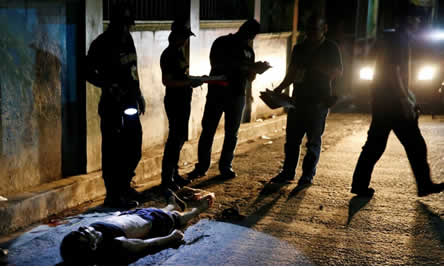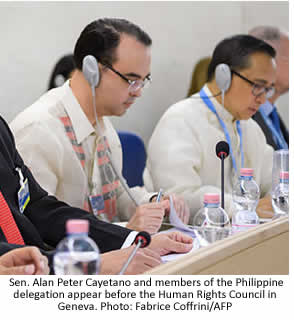|

Police torches light up the body of a suspected drug dealer, killed by
two men on motorcycles in Quezon City, Manila. Photo: Reuters/Erik De
Castro | atimes.com.
 he administration of President Rodrigo Duterte received a stunning rebuke from the United Nations’ Human Rights
Council in its just released draft report on the Philippines. Duterte’s
war on drugs and the alleged extra-judicial killing of thousands of
Filipinos appears to be widely condemned by the international community. he administration of President Rodrigo Duterte received a stunning rebuke from the United Nations’ Human Rights
Council in its just released draft report on the Philippines. Duterte’s
war on drugs and the alleged extra-judicial killing of thousands of
Filipinos appears to be widely condemned by the international community.
No less than 95 UN-member states
participated in the periodic review of the Philippines and offered a
staggering 257 recommendations to the Duterte administration. Below is a
small sample of those recommendations:
Provide adequate
resourcing to the Commission on Human Rights and allow it to
investigate alleged extrajudicial killings (Australia);
Ensure that the fight against crime strictly respects international
standards (Peru);
Take the necessary measures to combat drug trafficking, while
ensuring that the methods used are in conformity with international
standards (Haiti);
Bring in line with international best practices the methods of
combating the use of illegal drugs in the Philippines, namely in
terms of prevention and alternative sanctions (Portugal);
Preserve the right to life, do not bring back use of the death
penalty as proposed in the Death Penalty Bill (Liechtenstein);
Continue to uphold the implementation commitments, as a State Party
to the Second Optional Protocol to the International Covenant on
Civil and Political Rights, aiming at the abolition of the death
penalty (Romania);
Cease all steps to reintroduce the death penalty, contrary to its
obligations under the OP to the ICCPR; urgently accept a visit from
the Special Rapporteur on extrajudicial, summary or arbitrary
executions, without preconditions or limitations; fully investigate
and prosecute all cases of extrajudicial killings and enforced
disappearances; take immediate steps to combat torture in the
criminal justice system, including torture in police stations to
extract confessions; and fully respect international human rights
law in its efforts to combat the trade in and use of illegal drugs (Ireland);
Protect and guarantee the right to life and to a fair trial also in
the context of the campaign against drug trafficking, and take all
necessary steps to guarantee a proportionate use of force by the
security forces (Italy).
Among the members of the Philippine
delegation headed by Menardo Guevarra who flew to Geneva, Switzerland to
receive the report, was Philippine Senator Alan Peter Cayetano,
Duterte’s former running mate for vice president.
 Cayetano stirred controversy before the
council by stating during his presentation that reports of
state-sanctioned extrajudicial killings were simply “alternative
facts” that had no basis in reality. Given the ever-piling number of
casualties and pronouncements by Duterte himself, it is hard to believe
that anyone listening took Cayetano’s statement seriously. Instead, many
worried that it signified a level of intransigence and a refusal to
change by the Duterte administration. Cayetano stirred controversy before the
council by stating during his presentation that reports of
state-sanctioned extrajudicial killings were simply “alternative
facts” that had no basis in reality. Given the ever-piling number of
casualties and pronouncements by Duterte himself, it is hard to believe
that anyone listening took Cayetano’s statement seriously. Instead, many
worried that it signified a level of intransigence and a refusal to
change by the Duterte administration.
Human beings have evolved over millennia up
to this point where universal rights are in place, and every human on
earth is entitled to share in those rights. There can be no exceptions
for Duterte or anyone else to trample on those rights. Does Duterte and
his minions think they have a “special pass” to do what no other
democratic government on earth can do to its citizens? Duterte has to
realize that there will be consequences in the end. One cannot simply
reverse a thousand of years of civilization and revert to savagery, on
the pretext of bringing about an intended good.
If Duterte was a righteous leader, he would
conduct his “war on drugs” the proper way, and win it without trampling
on the rights and liberties of poor and defenseless Filipinos. History
has shown time and again that only tyrants and despots behave the way he
does. Published 5/12/17 |